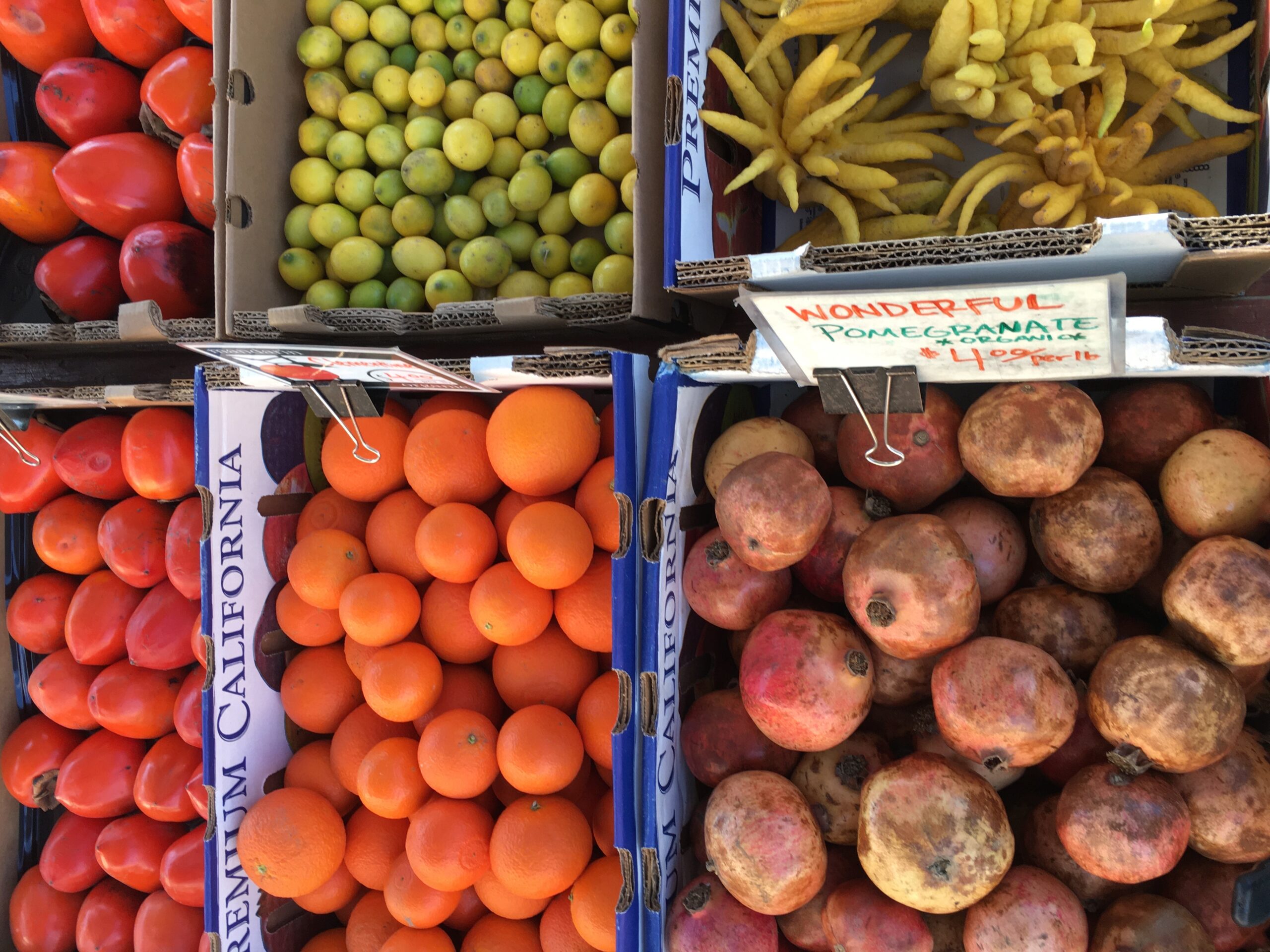That’s a wrap on 2020, and what a year it’s been! For many of us, the New Year is a symbol of rebirth, giving us a chance to start over, develop new habits, and become better versions of ourselves. New Year’s Resolutions, however, can be daunting, and most people give up their resolutions before the end of January. Instead of developing resolutions to improve ourselves, why not adopt New Year’s Resolutions that can help us improve the health of our planet?
Here are 7 Green New Year’s Resolutions from The Ecology Center HelpDesk that are eco-friendly, sustainable, and more importantly, achievable. By adopting one or more of these resolutions you can help reduce your waste and environmental impact. Together, let’s have a Green New Year!
1. Remember your Reusable Shopping Bags
Single-use plastics bags are banned in Berkeley and many other municipalities for a good reason. Plastic bags are fundamentally not recyclable, extremely costly to process, and primarily end up in landfills and waterways where they leach carcinogens into the environment, adversely impacting ecological and human health. Whether it is in use, recycled, landfilled, or in micro pieces in the environment, there is no “away” when we throw out plastic- so what are our alternatives?
Reusable shopping bags are a low-cost, long-lasting purchase that can significantly reduce the amount of plastic waste produced. Canvas, hemp, or organic cotton bags are great alternatives to plastic and help to reduce the demand for plastic production.
The COVID-19 pandemic has caused a surge in single-use plastics, even temporarily suspending plastic bag bans across the country. Still, there are ways to refuse plastic bags and stay in compliance such as bagging your own groceries outside, and opting for paper bags instead of plastic.
Shifting to sustainable shopping practices doesn’t always mean investing in new materials. In fact, true sustainability encourages utilizing resources that are already available to us. Don’t overlook the impact of reusing the plastic bags you already have in your home. By reusing those plastic shopping bags you’ve accumulated, you can extend the life of plastic film. You can also extend the life of the cardboard boxes you’ve collected in the mail by using them as an alternative to plastic bags at the grocery store. Cardboard boxes are much sturdier than plastic bags and will keep your groceries in place in the backseat of your car- no cracked eggs or broken glass!
2. Go Paperless
For the most part, 2020 has forced us to convert to a mostly-digital world, which is a win for reducing paper waste. The University of Southern Indiana reported that in years past, Americans have used up to 85,000,000 tons of paper per year. Here are a few ways you can go paperless this year:
- Opt for paperless bills and receipts. Making this small change not only helps you reduce your carbon footprint but can also help you keep better track of your purchases.
- Use services such as DocuSign for contracts and agreements. Choosing these services can help cut costs and reduce your carbon footprint by eliminating printing and transportation costs.
- Consume your news digitally and purchase an online subscription to your favorite publication. Each year an estimated 500,000 trees are cut down so people can enjoy their Sunday Newspaper. Let’s cut back on that number and support our media outlets online, where you can enjoy live news alerts, podcasts, and much more.
3. Reduce your Meat Intake and Consume More Sustainably
Meatless Mondays have numerous health and environmental benefits which help us combat heart disease, cancer, and climate change! By going plant-based at least one day per week, Americans could save approximately 1 billion gallons of water per year. Imagine how much water and resources we could save if we took Meatless Monday a step further by challenging ourselves to a plant-based diet 2-3 times a week. Here Are 35 Meatless Monday recipes to help you get started!
Not ready to commit to a plant-based diet? Opt for consuming sustainably sourced meat instead! What is sustainably-sourced meat? The definition varies, but in summary, it is meat that comes from farms that implement low-impact farming practices, which can include holistic grazing, water, and energy recycling, grass-fed livestock, reduced use of fertilizers, chemicals, and antibiotics, and organic farming. Knowing where to find sustainably sourced meat can be tricky since there is no standard definition. Here are some things to look for on your food labels: USDA organic certification, grass-fed, and Certified Humane. Buying sustainably sourced meat can be expensive, so we recommend buying in bulk and freezing meat for later use– no food waste!
Another great way to consume meat more sustainably is to purchase it from your local Farmers’ Market. Here, you can talk directly with farmers to learn how they raise their livestock and what practices they have implemented to reduce their environmental impact. Find your local California Farmers’ Market here.
4. Switch to bar soap and shampoo
While shampoo and body wash bottles are recyclable for the most part, up to 500 million shampoo bottles can end up in the landfill any given year because people more often throw them “away”. Switching to bar shampoo and soap can help your household reduce plastic waste and get more out of your product. When you purchase shampoo or body wash in a bottle, up to 80% of it is water. By opting for a dehydrated bar option, you are reducing unnecessary water consumption.
Check out the bar shampoo and soap options we offer at the Ecology Center! The Black Mountain Beauty bar conditioner is a staff favorite! If you can’t stay away from liquid soap, consider a refillable option from a business like Fillgood.Co where you can refill your own bottles with ethically sourced products you’ll love.
5. Find New Life in Old Clothes
“In 1930, the average American woman owned an average of nine outfits. Today we each buy more than 60 pieces of new clothing on average per year” – Overdressed by Elizabeth Cline
Retail therapy is a common way to relieve stress and gives consumers a feel-good moment. Did you know the textiles industry is the second biggest polluter after the oil and gas industry accounting for 10% of total carbon emissions per year? If you are able this year, challenge yourself not to buy any new clothing and make the most of the pieces you already own. Here are some tips to maximize your wardrobe and Shop Your Closet!
If you need a new piece of clothing for an interview or special occasion, consider buying secondhand or sustainable clothing. We recommend Good on You Brand Directory to find sustainable and ethical clothing brands and Poshmark for secondhand online shopping. If you’re in the East Bay, don’t forget about some local favorites including, Amour Vert, EthiCal Apparel, Harvest and Mill, and Taylor Jay. Lastly, don’t forget about the option to borrow! Many of the pieces in our closets only get worn once. If you need a clothing piece for a one-time occasion, consider borrowing something from a friend or family member or renting clothing from sites such as Rent the Runway or LeTote.
6. Avoid Online Shopping-Shop Local Instead!
Online retailers, like Amazon, have become one-stop-shops for practically everything. E-commerce has become an easy, convenient, and economical way to shop across the country, with hard -to-resist 1-day delivery options. However, the convenience comes at a cost- especially to our environment and ethics. Transporting packages increases greenhouse gas emissions and traffic-related air pollution, which often have disproportionate adverse health impacts on low-income and BIPOC communities. Many online retailers have an enormous packaging footprint that creates unnecessary waste that is often impossible or very difficult to recycle, despite being stamped with the chasing arrows symbol. With boxes packed inside boxes, the amount of cardboard used to ship packages each year equates to about 1 billion trees. While shopping online is convenient and allows for a broader selection, it also distances us from understanding the ethical business practices. To take care of the planet, we must also consider the well-being of one another and support businesses that demonstrate that they care for their workers.
Shopping locally helps put a face to a brand name and allows you to build lasting personal connections in your community. Supporting small local businesses also boosts your local economy, cuts transportation costs and environmental impacts, and takes the packaging issue out of the picture. This year, you can choose to make a conscious effort to keep your money where you live and spend it wisely!
7. Channel your inner handyperson and learn to fix your broken items!
Our fast-paced, innovative society has shifted away from repair-culture. When something breaks, we often insist on replacing it with something new. Repairing items instead of buying new helps to keep waste out of the landfill. If one of your home items breaks on you this year, challenge yourself to repair it at home!
If you are in the East Bay, check out Culture of Repair, a nonprofit organization dedicated to sharing repair knowledge and events to fix your household items! Join a virtual fix-it clinic, where you get one-on-one consultation from a repair expert volunteer.
There are many other ways to reduce your carbon footprint this year, and we would love to hear what green goals you have for the new year! Comment below, or email us at helpdesk@ecologycenter.org with your ideas!
Sources:
Overdressed: The Shockingly High Cost of Cheap Fashion. New York: Portfolio/Penguin. Cline, Elizabeth L, Overdressed: The Shockingly High Cost of Cheap Fashion. New York: Portfolio/Penguin, 20132012.
University of Southern Indiana Paper Recycling Facts
What Would Happen If Everyone Stopped Eating Meat One Day a Week?
Sustainable Meat: The Responsible Way to Eat Meat
How to Make the Healthiest, Most Ethical and Sustainable Food Choices If You Eat Meat, Dairy, and Eggs
The Case For Plastic-Free Shampoo and Conditioner
Socioeconomic Disparities and Air Pollution Exposure: A Global Review
What A Waste: Online Retail’s Big Packaging Problem
The Ethical Issues With Amazon







